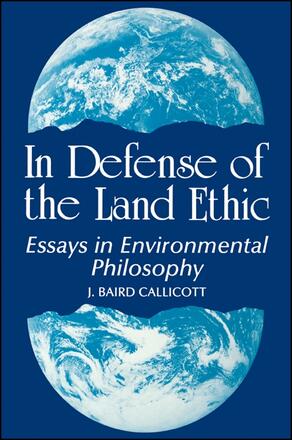
In Defense of the Land Ethic
Essays in Environmental Philosophy
Alternative formats available from:
Description
In Defense of the Land Ethic: Essays in Environmental Philosophy brings into a single volume J. Baird Callicott's decade-long effort to articulate, defend, and extend the seminal environmental philosophy of Aldo Leopold. A leading voice in this new field, Callicott sounds the depths of the proverbial iceberg, the tip of which is "The Land Ethic. "
"The Land Ethic," Callicott argues, is traceable to the moral psychology of David Hume and Charles Darwin's classical account of the origin and evolution of Hume's moral sentiments. Leopold adds an ecological vision of organic nature to these foundations.
How can an evolutionary and ecological environmental ethic bridge the gap between is and ought? How may wholes—species, ecosystems, and the biosphere itself—be the direct objects of moral concern? How may the intrinsic value of nonhuman natural entities and nature as a whole be justified?
In addition to confronting and resolving these distinctly philosophical queries, Callicott engages in lively debate with proponents of animal liberation and rights—finally to achieve an integrated theory of animal welfare and environmental ethics. He critically discusses the land ethic that is alleged to have prevailed among traditional American Indian peoples and points toward a new and equally revolutionary environmental aesthetic.
J. Baird Callicott is Professor of Philosophy and Natural Resources at the University of Wisconsin, Stevens Point. He is editor of Nature in Asian Traditions of Thought: Essays in Environmental Philosophy with Roger T. Ames, published by SUNY Press, Companion to a Sand County Almanac: Interpretive and Critical Essays, and author of Clothed-in-Fur and Other Tales: An Introduction to an Ojibwa World View with Thomas W. Overholt.
Reviews
"This book brings together in one volume a series of essays that have been seminal in the development of environmental philosophy. The reader feels the full impact of a persuasive environmental philosophy as it is now operating to form a world view, oriented toward appropriate biological concern and conservation. Callicott is a fine stylist. His essays are not aimed simply at an audience of fellow philosophers, but also at the general literate public. " — Holmes Rolston III, Colorado State University
"Aldo Leopold's 'The Land Ethic' is the single most important piece of writing on environmental ethics by a nonphilosopher. This book represents the most comprehensive discussion of philosophical aspects of Leopold's land ethic available. More than any other person, Callicott has focused on these issues. But the book also presents a body of work by an important environmental philosopher in his own right. "— Eugene C. Hargrove, University of Georgia